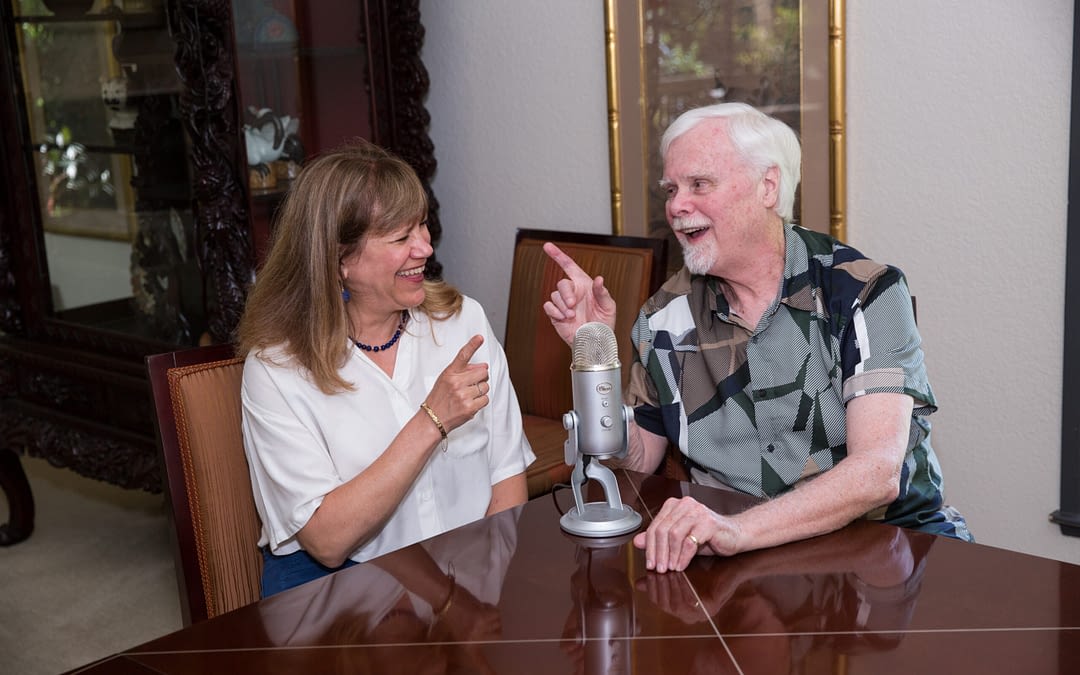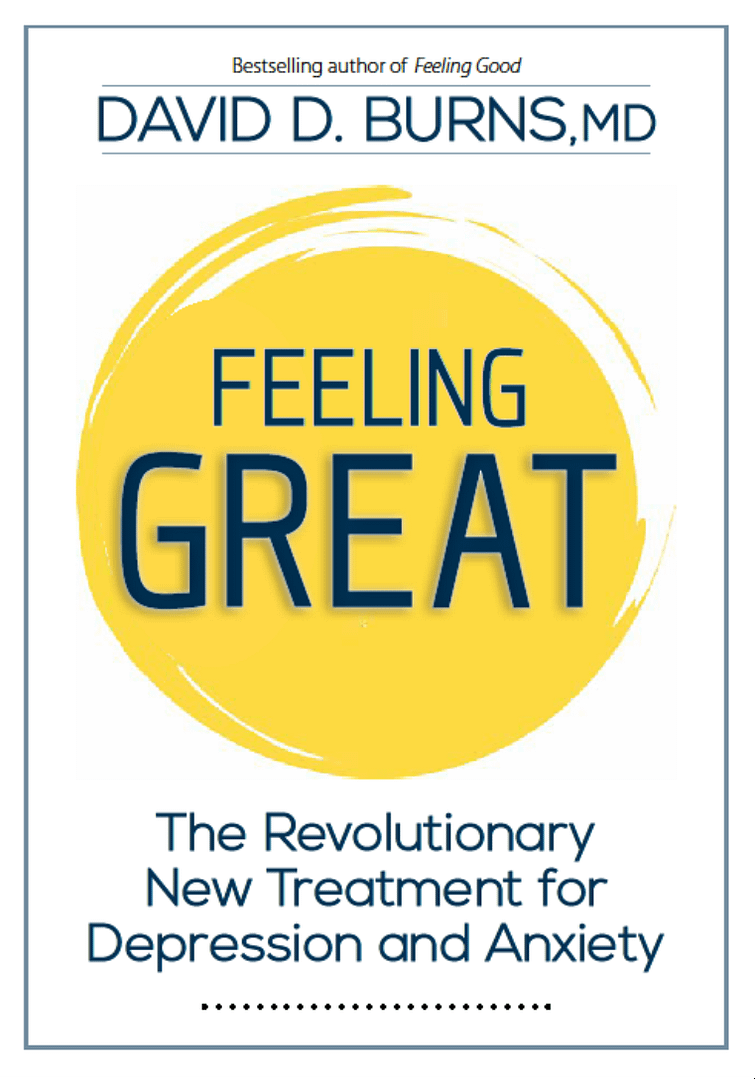Today, Rhonda and David answer three great questions submitted by listeners like you.
- I am confused about the terms, negative and positive distortions. Help!
- “How do you treat an “existential crisis?”
- Can you use the Five Secrets with someone in a hypo-manic state? Won’t agreeing with their accusations just make things worse?
1. I am confused about the terms, negative and positive distortions.
Dear Dr. Burns,
I do have one question about terms I have heard on the podcast. The terms that confuse me are “negative distortions” and “positive distortions.” I think I understand that they are both “bad” distortions, but the positive distortions are distortions related to moods or thoughts that are unhealthily high or “up,” such as in mania or narcissism. And negative distortions are the ones related to lower mood states/depression. Is this correct? I don’t know if it is a brain thing, but even though I think I understand the concepts, my brain still seems to automatically think of positive distortions as good, and so I become quite confused when trying to understand how to fight them or help someone else fight them . . .
Thank you again, so much, for all of your hard work on the podcast, as well as your diligence in training therapists in your TEAM model. I am a super-fan of the model already after only a week or so of listening! And the Five Secrets have challenged me to examine my communication abilities much more honestly and helped me in several important interactions already (even as a novice making many mistakes😬).
Thank you, thank you, thank you!
Please also tell Fabrice and Rhonda many thanks for all of their hard work and excellence as well. They both bring such gifts and refreshing honesty, brilliance and genuineness to the discussions. I especially admire Rhonda for sharing her personal work. Such powerful and transformative stuff! It gives me hope that someday I might be a fraction as brave to DO that kind of work, much less share it openly with others for their benefit. What a generous as well as brave thing to do! I feel so hopeful and encouraged to know there are therapists like you, Fabrice, and Rhonda helping people to heal from vast amounts of mental and emotional suffering. I can’t wait for TEAM to be as commonly known everywhere as CBT is now. Sign me up to volunteer for any promotional efforts if that is ever needed! For now, I will continue to tell everyone, including quite a few other counselor friends, about the podcast and the TEAM model.
Sincerely,
A new super-fan podcast listener,
Holly Miller
Hi Holly, Many people are confused, so this is a great question! Rhonda and I will gladly discuss this on our podcast. And thanks for your kind words!
david
2. Can you use the Five Secrets with someone in a hypo-manic state? Won’t agreeing with their accusations just make things worse?
Hi David and Rhonda,
Thank you so much for the podcast. I have been an avid listener since the early days of the podcast, and it has helped me through very difficult times and still is.
My question is related to my relationship with my future to be divorcee. She is at times in a hypo mania state due to her bipolar illness (which is diagnosed and treated).
Is it possible to use the five secrets of effective communication with someone who is in a state of hypo mania? I feel that agreeing with unreasonable accusations and complains is not helping at all and only causes her to hold to these claims.
I know that you usually like to relate to specific correspondence but it is more of a general question.
I hope you can give me some guidelines on what works and what doesn’t.
Thanks!
Al
Hi Al,
The devil is in the details. Can you provide a specific example of one thing she said, and exactly what you said next, that you need some help with? General questions about the Five Secrets are NEVER productive. Great question, thanks! david
David D. Burns, M.D.
Hi Dr. Burns,
Thanks for the prompt reply.
Well, I was asking a general question if it is possible at all to use the 5 secretes with someone who is totally unreasonable?
She would say “You started to be a father when you decided to divorce” referring to the fact that I am claiming for mutual custody. The fact of the matter is that she has been going in and out of long depression periods and manic periods and I had to take care of the kids, maintain the house and keep a job (working from home).
I would answer that I was there taking care of the kids all the years and now that I decide to break I want to keep my fair share of the time with them.
Prior to that she always claimed that I am not a good spouse although I took care of her during all the years and had at times to reduce my workload in order to be available for the kids and her.
So, the claims and accusations are always discounting what I did for her and the kids. And she is not accepting the fact that she has been ill and that this had a toll on the family. She says I need to look forward even though these episodes on hypo mania keep repeating.
Hope I was specific enough. If you still feel I am vague then it may be that this is not the right forum to ask such questions and may need to get proper consultation.
All the best and looking forward to reading the new book. I already started with the free chapter.
Al
David and Rhonda describe ‘mania” and “hypo-mania” model how to find truth in criticisms that seem irrational, exaggerated, untrue, or unfair. They also discuss the tendency to blame others for the problems in our relationships, and why and how that is rarely or never helpful.
3. “How do you treat an “existential crisis?”
Good afternoon Dr. Burns,
Have you treated anyone that went through an existential crisis before and were you successful? I have a wife that deals with depression and I was in the past able to help her (even though my mind set was “life is awesome. so why or how can you be upset?”)
I have also dealt with my own anxiety and was able to get myself out of that 10 years ago, using exposure techniques. But I have ran into a bit of a wall here with what I believe is an existential crisis. I’ve noticed that I am unable to find anything of that subject in any of your topics.
Thank you for your time, Dr. Burns.
In the podcast, Rhonda and I demonstrate how to respond effectively to someone who is depressed, and why cheer-leading (“life is awesome,” etc.) will generally not be helpful.
Hi Arturo,
There are no existential crises in California at this time, as the Buddha pointed out more than 2500 years ago. However, specific and real problems exist, and once you identify what’s bugging you and you deal with it you’ll find your “existential crisis” has disappeared.
Check out my podcast on the teenage girl who was having an “identity crisis.”
Our podcast on “How to Help” might also be useful to you!
You might also enjoy my book, When Panic Attacks, especially the section on the Hidden Emotion Technique. If you go to my website, you can type any topic in the search box in the right-hand panel of every page, and a lot of useful information, will suddenly pop up.
David and Rhonda
You can reach Dr. Burns at david@feelinggood.com. Dr. Rhonda Barovsky practices in Walnut Creek, California, and can be reached at rbarovsky@aol.com. She is a Certified TEAM-CBT therapist and specializes in the treatment of trauma, anxiety, depression, and relationship problems.
If you like our jingle music and would like to support the composer Brett Van Donsel, you may download it here.
Coming up in 2020
I will present two workshops at the upcoming
Psychotherapy Networker Conference!
Saturday, March 21, 2020
Feeling Great—A New, High-Speed
Treatment for Depression
Sunday, March 22, 2020
Overcoming Magical Thinking with the Anxious Client—
A Paradoxical Approach
Plus, my new book, Feeling Great,
will be officially announced with banners and such!
* * *
The Cognitive Distortion Starter Kit:
How to Crush Negative Thoughts
TEAM-CBT includes more than 100 powerful techniques to change the distorted thoughts that trigger negative emotions. But what techniques should I select for my patient who feels depressed, anxious, or angry?
As you know, in my book, Feeling Good, I listed the ten most common cognitive distortions, like All-or-Nothing Thinking, Should Statements, Emotional Reasoning, and more, and you probably use that list all the time in your clinical work. But do you know which techniques work the best for each distortion?
Come to this workshop and find out! You’ll learn with tons of cool techniques you can use every day to boost your clinical effectiveness.
This workshop will be live-streamed (and in person in Palo Alto, CA) so you can join from anywhere in the world! There will be many expert online helpers to assist you with the small-group exercises.
Move rapidly if you want to come. We are already SOLD OUT in person, but there are still slots available online.
There will be many helpers from the Feeling Good Institute to assist and guide you in the small group exercises in person and online as well. Our last workshop on resistance in February was our most highly rated ever! We hope to make this a terrific and fun learning experience for you, too!
With Drs. David Burns and Jill Levitt
May 17, 2020 | 7 CE hours. $135 (online only)
Learn More & Register
* * *
2-Day Clinical Master Class
Rapid Recovery from Anxiety Disorders–
GAD, Phobias, Panic Attacks, Social Anxiety, OCD, PTSD and Health Anxiety
by David D. Burns, MD
June 4 – 5, 2020, Seattle, Washington
* * *
The All-New Annual South San Francisco Intensive!
Enhanced Empathy Training
August 10 – 13, 2020
It’s Going to Be Awesome!
Videos, Live Demonstrations
Small Group Practice with
Personal Feedback and Mentoring,
and Chances for Personal Work and Healing
During this four-day intensive workshop you will learn:
- How to develop deeper and more meaningful relationships with challenging, difficult clients.
- How to deal skillfully with people who refuse to open up and talk to you; won’t listen; are relentlessly critical, narcissistic or controlling; always have to be right; use, abuse, or exploit you; complain endlessly; are hostile, threatening or violent; as well as clients who are overwhelmed, hopeless and suicidal.
- How to develop more loving relationships with the people you care about—as well as the ones you don’t.
- Powerful new techniques to help clients who are struggling with conflicts with loved ones, friends, or colleagues.
- How to deal with the inner chatter and powerful feelings that make it so difficult to deal with conflict when you feel angry or hurt.
- How to identify and modify the self-defeating beliefs that make us vulnerable to conflicts with others.
- How to identify and melt away the intense outcome and process resistance that make the treatment of relationship problems so challenging.



